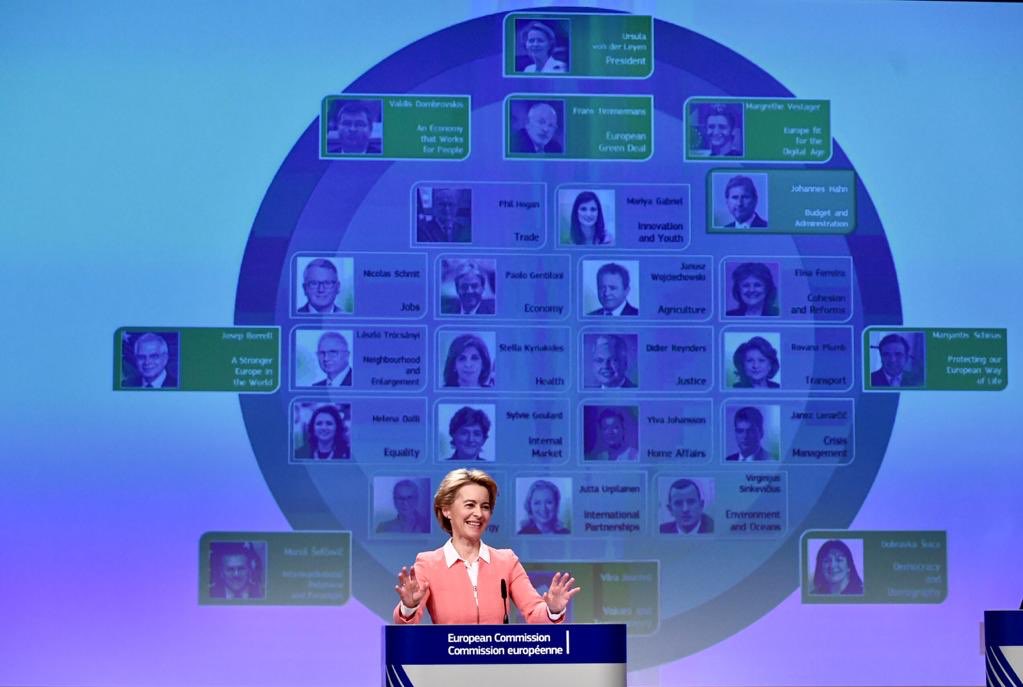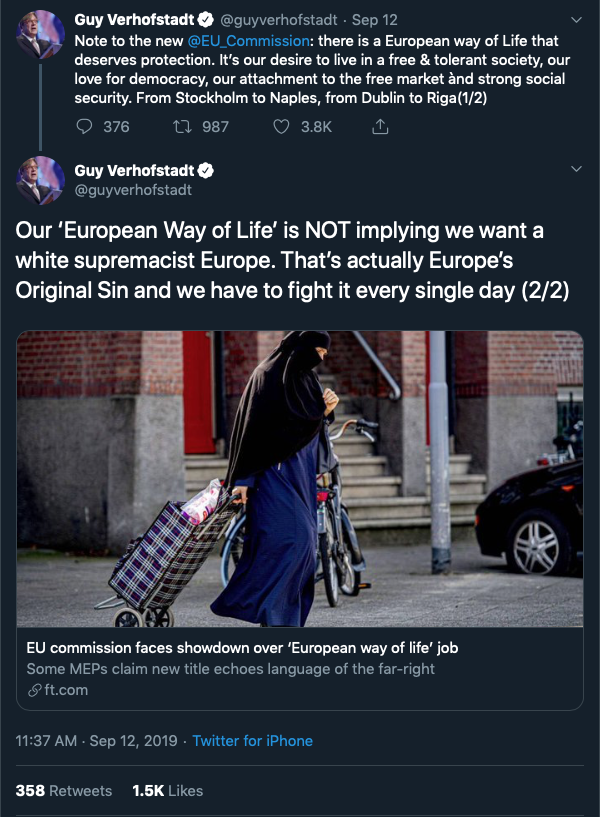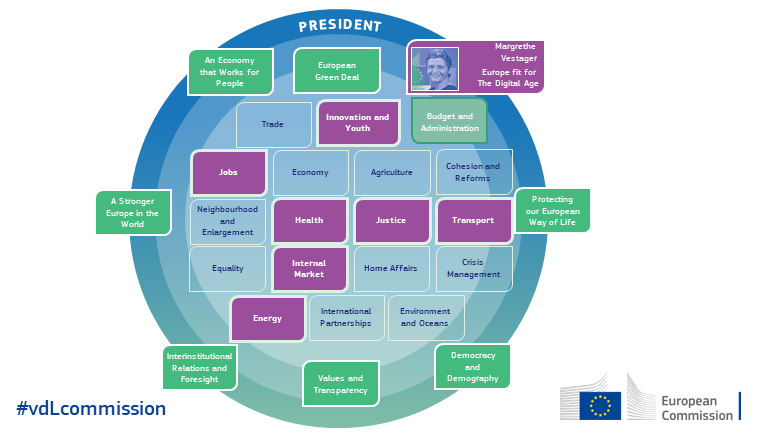16 September 2019 | By Michael Thaidigsmann
New European Commission
A better way for Europe?
Ursula von der Leyen has unveiled her 27-member team and assigned them the portfolios. The designated commissioners will now have to convince the European Parliament.

Former German Defence Minister Ursula von der Leyen, who in July was elected to succeed Jean-Claude Juncker as president of the European Commission, has unveiled the names of her 26 future colleagues and attributed them individual portfolios with sometimes fanciful titles.
The new Commission, which is to take office on 1 November 2019, is still subject to a confirmatory vote in the European Parliament. Before that, the nominees – one from each member state – will be grilled by individually by the relevant parliamentary committees, and it is quite possible that some candidates will be rejected by MEPs and withdraw.
For the first time, the EU executive will have a female president. In addition, 13 of the 27 new commissioners are women.
The new College will have eight vice-presidents, which is unprecedented. These include, ex officio, the High Representative for Foreign Policy and Security Policy Josep Borrell from Spain. The vice-presidents will coordinate wider policy areas and oversee the work of their colleagues with individual portfolios.
Three of the eight – Frans Timmermans (Netherlands), Margarethe Vestager (Denmark) and Valdis Dombrovskis (Latvia) will get the even grander title of Executive Vice-President. They will have a double function: In addition to being vice-president responsible for one of three core topics of von der Leyen’s agenda, they will serve as commissioners with their own portfolio and also head a Commission department.

The Social Democrat Timmermans will be tasked with coordinating the work on the so-called European Green Deal and manage the EU’s climate policy, supported by a new Directorate-General for Climate Action. The Liberal politician Vestager will take charge of making “Europe fit for the digital age”. She will, crucially, retain her current role as competition commissioner and therefore be one of the strongest players in the new Commission. The third among the EVPs, Valdis Dombrovskis, a member of the European People’s Party, will coordinate work on what is now called an “Economy that Works for People”. In addition, he will also become the commissioner in charge of financial services.
In June, both Timmermans and Vestager were considered contenders for the top job themselves, but failed to garner sufficient support among governments and lawmakers in the European Parliament. Instead, von der Leyen became the surprise candidate of the European Council and managed to win a narrow majority in the European Parliament.
Apart from Borrell, who will have the double role of vice-president of the Commission (reporting to von der Leyen) and ‘foreign minister’ of the EU, reporting to the Council, five other Commission vice-presidents were named by von der Leyen.
Aside from Borrell, they are Věra Jourová (Czech Republic), who is to oversee the field of “Values and Transparency”; Margaritis Schinas (Greece), a former MEP and until now Juncker’s chief spokesman who got assigned the mission of “Protecting our European Way of Life”, including the migration issue; Maroš Šefčovič (Slovakia), a sitting vice-president in the Juncker Commission who will become in charge of “Interinstitutional Relations and Foresight”; and Dubravka Šuica (Croatia), a sitting MEP who will deal with “Democracy and Demography”. The vice-presidents would be responsible for the top priorities laid out in the president-elect’s guidelines which she submitted to the European Parliament in July, said von der Leyen.
Criticism
The new Commission president came in for derision and criticism for the new job titles she created, especially that given to Schinas, with some lawmakers in the European Parliament regarding it as “grotesque.” The Dutch lawmaker Sophie in ‘t Veld remarked: “The very point about the European way of life, is the freedom for individuals to choose their own way of life. We do not need a commissioner for that, thank you very much.”
Among the other commissioners named on Tuesday, France’s Sylvie Goulard – a member of Emmanuel Macron’s party – netted the crucial Internal Market portfolio where she will also be in charge of industrial policy, the EU’s Digital Single Market agenda as well as defence industry and space matters.

Key jobs
Justice affairs, including the controversial issue of enforcing the rule of law in EU member states, will be overseen by Didier Reynders, a Liberal politician who until now has served as Belgium’s minister of foreign affairs. The Social Democrat Paolo Gentiloni, another former foreign and later prime minister of Italy, will become commissioner for economic affairs, with responsibility for enforcing fiscal rules. Furthermore, the EPP politician Janusz Wojciechowski from Poland will be put in charge of the agriculture portfolio. His country is the largest recipient of agriculture subsidies in the EU.
Mariya Gabriel from Bulgaria, at present already a member of the Commission, will take over management of Horizon Europe, the EU’s €94 billion research programme, and the education portfolio.
Substantial salaries
The new Commission will, if it wins a confidence vote in the European Parliament, take office on 1 November 2019. Its term will last five years.
Upon assuming office, all commissioners have to take an oath of office before the European Court of Justice.
They will be paid a basic monthly salary of around €22,400 per month, with the president receiving €27,400 and vice-presidents around €25,000. Further allowances are paid on top of these. All commissioners will receive a life-long pension from the EU, irrespective of the length of their service.
Observers expect the new executive to push for more geopolitical autonomy of the EU and a more proactive stance in international affairs.
Among the list of nominees, there is one notable absence: The UK government, currently still a member of the EU, chose not name a commissioner, referring to its intention to leave the union by 31 October.
|
The new European Commission President Ursula von der Leyen (Germany, EPP) Executive Vice-Presidents Frans Timmermans (Netherlands, S&D) – European Green Deal; Climate Action Margarethe Vestager (Denmark, Renew Europe) – Europe Fit for the Digital Age, Competition Valdis Dombrovskis (Latvia, EPP) – An Economy that Works for People; Financial Services Vice-Presidents Josep Borrell (Spain, S&D) – A Stronger Europe in the World; High Representative for EU Foreign Policy and Security Policy Věra Jourová (Czech Republic) – Values and Transparency Margaritis Schinas (Greece, EPP) – Protecting our European Way of Life Maroš Šefčovič (Slovakia, S&D) – Interinstitutional Relations and Foresight Dubravka Šuica (Croatia, EPP) – Democracy and Demography Other Commissioners Johannes Hahn (Austria, EPP) – Budget and Administration Didier Reynders (Belgium, Renew Europe) – Justice (including the topic of the rule of law) Mariya Gabriel (Bulgaria, EPP) – Innovation and Youth Stella Kyriakides (Cyprus, EPP) – Health Kadri Simson (Estonia, Renew Europe) – Energy Jutta Urpilainen (Finland, S&D) – International Partnerships Sylvie Goulard (France, Renew Europe) – Internal Market (including industrial policy, Digital Single Market, Defence Industry and Space) László Trócsányi (Hungary, EPP) – Neighbourhood and Enlargement Phil Hogan (Ireland, EPP) – Trade Paolo Gentiloni (Italy, S&D) – Economy Virginijus Sinkevičius (Lithuania, Greens) – Environment and Oceans Nicolas Schmit (Luxembourg, S&D) – Jobs Helena Dalli (Malta, S&D) – Equality Janusz Wojciechowski (Poland, EPP) – Agriculture Elisa Ferreira (Portugal, S&D) – Cohesion and Reforms Rovana Plumb (Romania, S&D) – Transport Janez Lenarčič (Slovenia, Renew Europe) – Crisis Management Ylva Johansson (Sweden, S&D) – Home Affairs
|






